Understanding cardinal numbers
Matching numerals and amounts
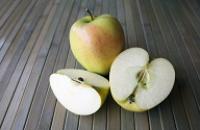
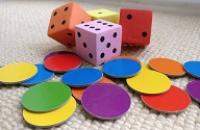
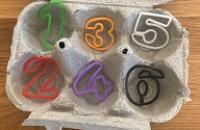
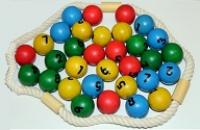
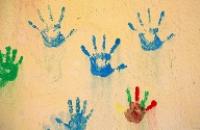
Children often enjoy finding things which are the same.
Adults could provide lots of different images and resources to show the value of numbers and numerals.
The Activity
Hold up five fingers, a giant dotty dice or a large numeral and ask the children to show you that number in different ways. Put out lots of different things which children can use to show the numbers, including countable items like conkers, small world toys, large blocks, multilink, dot images like dice and dominoes, structured apparatus like Numicon, Cuisenaire or an abacus, things in packs like egg boxes and crayon cartons, and number symbols including washing lines, number lines and 100 squares.
Encouraging mathematical thinking and reasoning:
Describing
How does this five look different from that five?
What does this pattern of five look like?
What can you see?
How did you make five with two hands?
Reasoning
How do you know these are the same number?
What is the same and what is different about these fives?
Opening Out
Can you show me five fingers a different way? Is there another way? What different patterns can you make with five counters?
Can you see any numbers hidden inside this pattern of five?
Can you show me 15? How do you know it is 15?
Recording
Can you draw or record your patterns?
Can you put something on the paper to show how many there are? Can you put some numbers to show what hidden numbers you see?
The Mathematical Journey
Counting and cardinality:
- using counting to check
- subitising - recognising the number of items without counting
- conservation - rearranging items and explaining that the number is the same because the arrangement can be returned to the original and none have been added or taken away
- matching two groups one-to-one to show that they have the same number
Matching numerals and amounts:
- selecting number symbols to match the total or numbers inside numbers
Composition of numbers:
- talking about numbers being made up of other numbers: "It's six because I see three and three"
- knowing number facts e.g. "Five and one more makes six"
Development and Variation
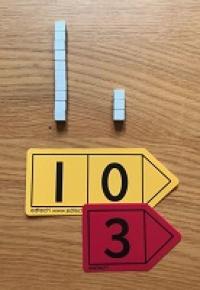
Ask children to show different numbers.
Have a display table for the number of the day or week, or where children can choose a number to make a display for. Show number symbols in different forms and scripts e.g. on calculator.
Number hunt: hide numerals and bags with numbers of things in (e.g. conkers).
Use laminated cards with dots or pictures and ask children to find a numeral and then items or pictures with the same number.
Make different patterns for the same number with objects on trays; take photos.
Use overlapping digit cards for teen numbers (see picture) and same colour sticks of 10.
Resources
Countable items: conkers, small world toys, large blocks, multilink and pennies.
Dot pattern images: dice, dominoes and Hungarian number pictures.
Structured resources: Numicon, Cuisenaire, unifix with same colour sticks of 10, 10p coins.
Things in pairs or packs: pairs of baby socks, egg boxes, packets of crayons or multipacks.
Numerals in different styles, on tiles, washing lines, giant number tracks, 100 square mats, overlapping place value cards for teen numbers, calculators.
Numerals on everyday objects like birthday cards, football shirts, calendars, clocks and measuring equipment e.g. height charts.
Displays of numbers in different arrangements with numerals e.g. staircases of rods, conkers on strings, number lines or tracks with numerals and dot patterns.
Download a PDF of this resource.
Acknowledgements: Jenni Back and Janine Davenall

